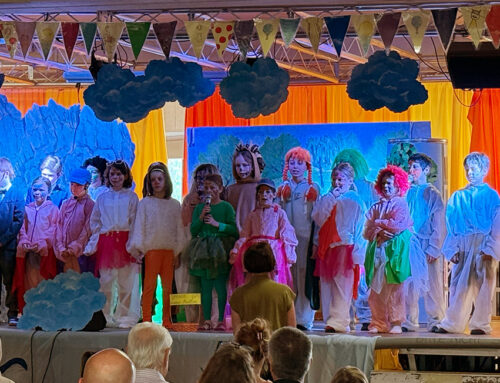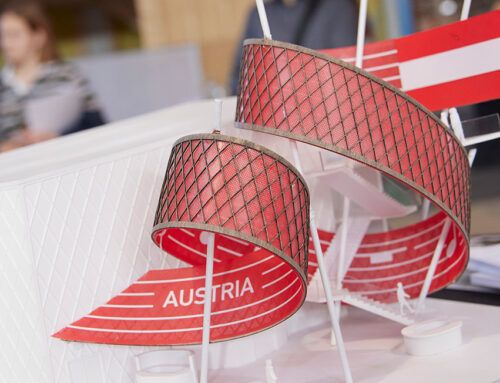Cochlear implant for a toddler: the early days according to parents
Little Julia was eight months old when her hearing loss was first noticed. For her and her parents, this marks the beginning of an exciting and eventful journey from the world of silence to the world of sounds and voices.
Dorota and Paul, parents of Julia and Maja
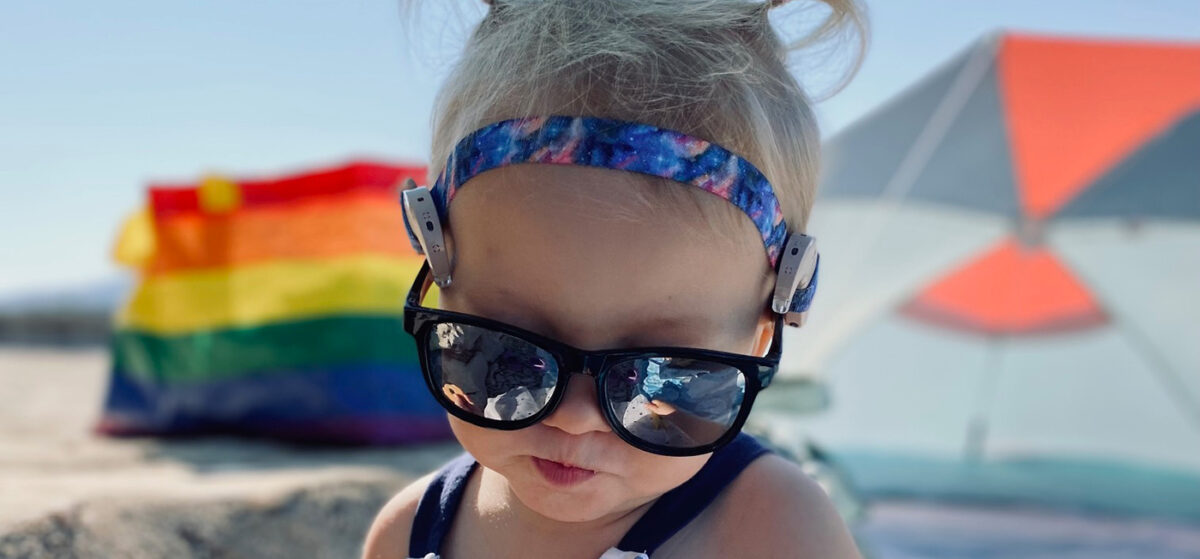
Our shared adventure with our daughter's hearing loss began on February 27, 2020, the day our little heroine Julia was born - and the second birthday of our older daughter Maja. The pregnancy with Julia and the delivery went like a picture book. Although Julia's hearing loss was omnipresent from the start, we didn't notice it. Due to a chain of different, sometimes unfortunate circumstances, we only found out eight months later that our daughter couldn't hear.
We slowly awoke from the dream that Julia was a child with normal hearing. A paracentesis and the BERA test results finally confirmed Julia's complete hearing loss. This period was and still is the most difficult phase of Julia's journey between two worlds: On one side, the world of complete silence and on the other, the world of hearing and speaking, noises and sounds.
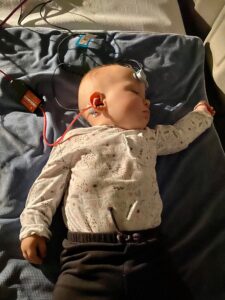
Little Julia during the BERA examination for a precise assessment of her hearing impairment. ©private
We have grown into the situation
The initial sadness soon turned into great anger and rage. Countless questions bubbled up in our heads at the time: Why Julia? Did we do something wrong? Why didn't we as parents notice this sooner? What should we do now? What can be done next? What will it be like?
There was a parallel development in which we grew into the situation bit by bit. The more information we had about Julia's hearing loss and the more it was confirmed, the more we learned about the issue and about possible "ways out". As a result, we changed our view that hearing loss is not a hopeless "sentence" in this day and age and thanks to medical progress.
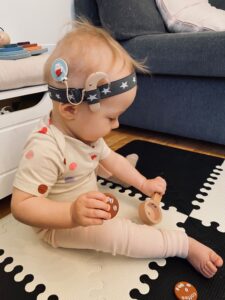
Little Julia on her way to hearing . ©private
Our confidence grew and intensified with each passing day. It helped us to clearly see the light at the end of the mental tunnel we had just entered.
Each day brought new experiences and new emotions
We found a lot of information about cochlear implants: Today's medicine offers many different options and regular therapy can provide very satisfying results.
The time leading up to Julia's implantation was very intense and difficult for our family. New emotions and new experiences accompanied us at each of the necessary examinations, at each medical appointment and at each preliminary consultation. We decided to turn these emotions into positive energy for Julia's well-being.
Finally, the long-awaited day of the operation arrived - a very important date for all of us. Five days before Julia's first birthday, she was implanted with cochlear implants on both sides. The day of the operation was the end of a very difficult part of our lives, but also the beginning of the wonderful journey of our little girl's hearing. We looked forward to the day of the "first fitting" with great anticipation and a pinch of uncertainty.
Hearing loss is an integral part of our Julia
It was an indescribably beautiful and touching feeling to see how Julia registered the first sounds and noises. How she discovered the world of the hearing step by step; how she got to know her surroundings and the world anew. Every little reaction from Julia to sounds, noises and our voices filled us with enormous joy and gave us a feeling of confirmation, but also relief. What we previously took for granted or didn't even notice in our older daughter's hearing and speech development, we now enjoyed down to the smallest detail in Julia's current situation.
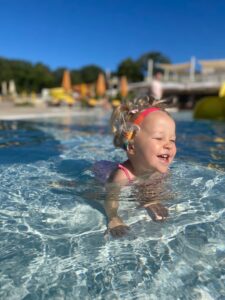
With the WaterWear system, Julia can also enjoy bathing while hearing. ©private
Our biggest worry was that we would never be able to hear Julia's voice, her timbre, intonation and expression. Fortunately, this worry now belongs to the past. We think that Julia is making very good progress as a three-and-a-half-year-old. In relation to her initial situation, she is at a very good stage of development. Regardless of Julia's future hearing and speech development, we are very happy and proud that our decision has opened the door to the world of hearing for her.
We no longer see Julia's hearing loss as an illness, disability or impairment. It is simply part of our everyday life, with better and worse moments. It is also an inseparable part of our child; a characteristic that makes her incredibly unique. Every day she confirms this with the next new word spoken - and heard.


